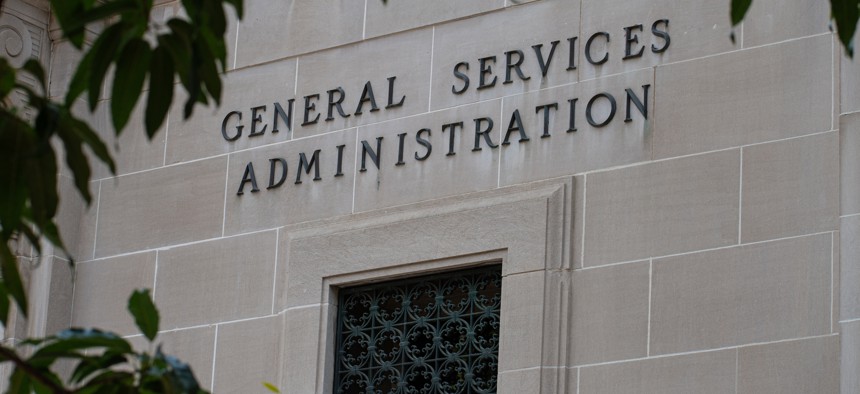
GSA's Technology Transformation Services was named among the agency's top management and performance challenges for Fiscal Year 2024 by its inspector general. Douglas Rissing/Getty Images
GSA is at a ‘critical juncture’ to salvage faith in TTS, agency watchdog warns
GSA’s inspector general says that it’s “trying to prevent the next Login.gov” — referencing a bombshell oversight report on GSA’s single sign-on service issued earlier this year.
The General Services Administration and its Federal Acquisition Service are “at a critical juncture,” the agency’s watchdog office writes in a recent assessment, “to restore confidence and trust in [the Technology Transformation Services] from its customers, Congress and the American taxpayer.”
The Office of the Inspector General listed “establishing and maintaining an effective internal control environment” within GSA more broadly as the first challenge in the annual OIG assessment, as it has previously
But the inclusion of TTS — which covers the tech consultancy 18F, cloud.gov, Login.gov and more — in the annual assessment as its own challenge is new. The document is not a formal audit, but it does signal what the OIG considers as GSA’s top challenges.
The watchdog says that TTS needs better management controls and financial management, pointing to existing oversight reports on the service and its components, including a report released earlier this year laying out how GSA officials had misled other agencies about the standards met by its single sign-on service, Login.gov. That report has led some members of Congress to argue for a defunding of 18F, which helped in the development of the service.
The assessment also points to cost recovery problems at TTS, which is funded in part by the Acquisition Services Fund, a revolving fund meant to be cost recoverable. In 2021, then-TTS leadership told staff it should prioritize service delivery over cost recovery, what the OIG calls “a flagrant and intentional violation of the [ASF’s] authorizing legislation.” TTS had an operating deficit of about $30 million as of mid-2022.
“You said you were giving up the focus on financial recovery to focus on your products, but now your products are failing too,” Tom Tripple, regional inspector general for auditing, told Nextgov/FCW. “This is maybe a bigger issue.”
The watchdog's objective? “We’re trying to prevent the next Login.gov," Tripple said.
GSA leadership says that it has been taking action on the issues laid out by the Inspector General.
TTS is “standardizing our practices for how we manage our programs, integrating best practices in tech along with the requirements of our government,” TTS Commissioner Ann Lewis — who was appointed to lead the service late last year, shortly before the damning Login.gov report — said in a statement to Nextgov/FCW.
“We’ve taken a deep look this year at all TTS program governance structures — overall and program-by-program — working with partners at [the Office of Management and Budget] to ensure that we’re managing requests and funds in ways that allow us to accomplish high-priority goals in financially-prudent ways,” said Lewis.
FAS Commissioner Sonny Hashmi — who recently announced he will be leaving government later this month — also noted in a statement to Nextgov/FCW that the agency has done a review of TTS financial operations and management controls and baked resulting recommendations into a FAS management control and oversight corrective action plan, something the agency pledged to do in response to the OIG report on Login.gov.
He also pointed to the hire of a new chief operating officer at TTS and the expansion of a Technology Law Division in the GSA General Counsel’s Office, also created during the Login.gov fallout.
In this assessment and other OIG reports, the watchdog pins the problems at least in part on TTS culture.
In the Login.gov report, Hashmi is quoted as citing a “historic 18F culture that considered oversight burdensome” as a root cause for Login.gov’s woes in addition to “business pressures for Login.gov to close deals, increase revenue and achieve cost recovery.”
Lewis said in her statement to Nextgov/FCW that TTS is “investing in product strategy and product management, standardizing agile development practices and bringing in tech industry standard planning practices.”
TTS is also “ensuring strong systems of internal controls, developing robust standard operating procedures and developing stronger financial management practices, including driving towards cost recoverability” and working towards a new pricing model for Login.gov, said Lewis.
In terms of cost recovery, Lewis told Nextgov/FCW that TTS program teams “have instituted regular program reviews, roadmap development, budget deep dives and process examinations to improve efficiencies.”
The business volume of TTS was $131 million in 2023 — below the target of $157 million, but up from $112 million in fiscal 2022 and $96 million in fiscal 2021, according to the agency’s fiscal 2024 financial report.
As of April, the agency was projecting a net negative financial impact for TTS of about $29 million, said Tripple. GSA didn’t directly respond to Nextgov/FCW to questions on TTS finances.
Lewis has previously told Nextgov/FCW that TTS also provides value beyond cost recovery, citing the reusable tech products and services it houses and calling a singular focus on cost recovery a “disservice to our agency partners and the public.
”For now, the OIG says it will be watching. It has an audit of TTS hiring practices already planned, said Tripple.







